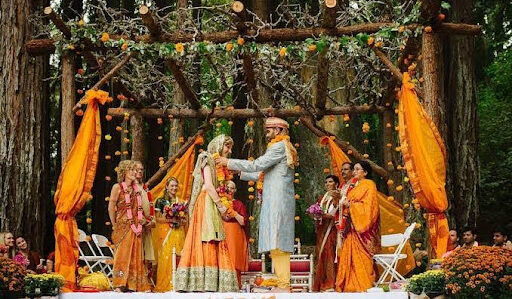Introduction
Planning a wedding with eco-friendly practices not only reflects a commitment to sustainability but also allows you to celebrate your special day with a clear conscience. By incorporating green practices into your wedding planning, you can reduce waste, minimise environmental impact, and inspire others to consider sustainability. Here’s a guide to help you plan an eco-friendly wedding that’s beautiful and sustainable.

1. Choose a green venue.
Select a venue that prioritises sustainability. Many venues now offer eco-friendly options, such as using renewable energy, recycling, and reducing water consumption. Opt for venues that emphasise green practices or are certified as environmentally friendly. If possible, choose a location that minimises travel for guests to reduce the carbon footprint.
2. Opt for digital invitations.
Reduce paper waste by sending digital invitations instead of traditional printed ones. Online invitations are not only eco-friendly but also convenient for tracking RSVPs and providing updates. If you prefer physical invitations, choose recycled or sustainably sourced paper and use eco-friendly inks.
3. Use seasonal and local flowers.
Select flowers that are in season and locally grown to minimise the environmental impact of transportation and reduce the carbon footprint associated with importing flowers. Additionally, consider using potted plants that guests can take home and grow, or opt for dried flowers that can be kept as keepsakes.
4. Choose sustainable attire.
Look for wedding attire made from eco-friendly materials, such as organic cotton, bamboo, or recycled fabrics. Consider buying second-hand or vintage dresses and suits, or rent your attire for the event. Encourage your bridal party to choose outfits they can wear again or that are made from sustainable materials.
5. Go for eco-friendly decor.
Decorate your wedding with items that are reusable, recyclable, or biodegradable. Use fabric bunting, wooden signage, or potted plants instead of single-use decorations. If you plan to use balloons, opt for biodegradable options. After the wedding, donate or repurpose décor items to avoid unnecessary waste.

6. Select a Green Category.
Choose a caterer that uses locally sourced organic and seasonal ingredients. You can also offer a plant-based menu or include more vegetarian and vegan options, which typically have a lower environmental impact compared to meat-based dishes. Additionally, use reusable or compostable serving ware to reduce waste.
7. Reduce food waste.
Plan your menu and guest count carefully to minimise food waste. Consider providing guests with options to take home leftovers or work with your caterer to donate surplus food to local charities. Inform your guests about any special dietary requirements in advance to ensure that all food is enjoyed and none goes to waste.
8. Use Eco-Friendly Favours.
If you choose to provide wedding favours, opt for items that are useful, sustainable, and environmentally friendly. Ideas include seed packets, reusable straws, or locally made products. Avoid single-use plastic items and consider donating to a charitable cause on behalf of your guests.
9. Implement waste reduction strategies.
Set up clearly labelled recycling and composting bins at your wedding venue to encourage guests to dispose of waste properly. Work with your venue and caterer to ensure that waste management practices are in place. Additionally, consider creating a waste reduction plan to minimise the amount of trash generated.
10. Choose green transportation.
Encourage carpooling among guests or arrange group transportation options to reduce the carbon footprint associated with travel. If your venue allows, consider renting bicycles or providing shuttle services to minimise individual car use.
11. Consider a Wedding Registry with a Green Focus.
Create a wedding registry that includes eco-friendly or sustainable products. Many companies offer options for green gifts, such as energy-efficient appliances or ethically sourced items. You can also include contributions to environmental causes or projects as part of your registry.

12. Offset Your Carbon Footprint.
Calculate the carbon footprint of your wedding and consider purchasing carbon offsets to compensate for the emissions. This can be done through various environmental organisations that invest in projects aimed at reducing greenhouse gases.
13. Plan a minimalist wedding.
Embrace a minimalist approach to your wedding by focussing on what truly matters and reducing unnecessary elements. A simpler, more intentional celebration often results in less waste and a smaller environmental footprint.

Conclusion
By integrating these eco-friendly practices into your wedding planning, you can create a celebration that aligns with your values and promotes sustainability. Not only will you be reducing your environmental impact, but you’ll also set an example for others and contribute to a more sustainable future.

